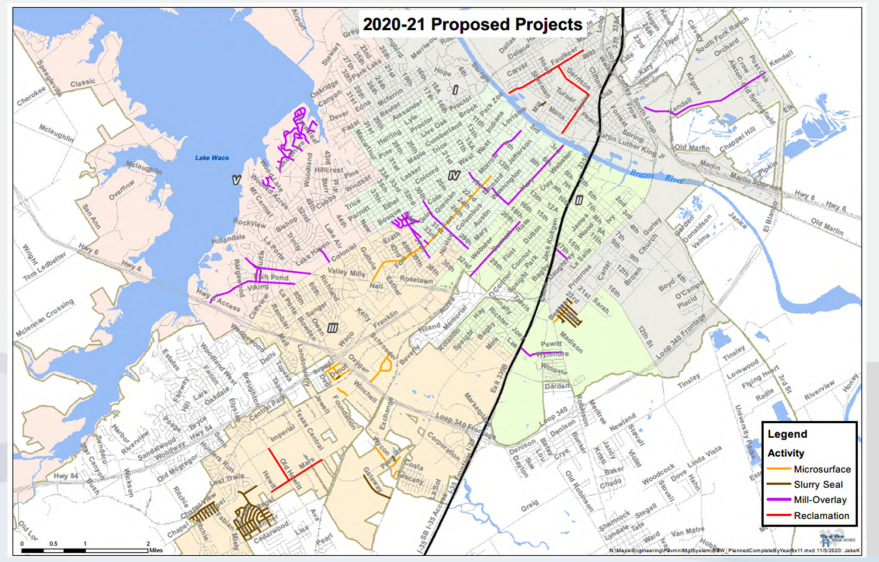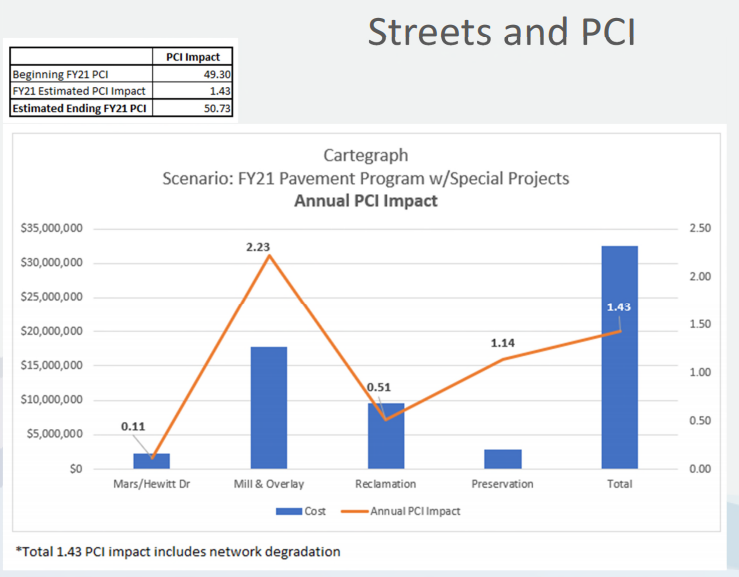Civic Insights: Capital Improvement Program (CIP) Coming to a Road Near You
(City council, school board, planning commission, county commissioners – these groups and several others represent us. They do the day to day work of running our community. It is our responsibility to keep informed about their work so that we can help them represent us effectively. “Civic Insights” by Jeffrey Vitarius is a regular feature of Act Locally Waco. Its purpose is to help us understand decisions that shape our community so that we can participate effectively as informed, engaged residents of Waco. – ALW)

By Jeffrey Vitarius
On Tuesday November 10, 2020, the Budget & Audit committee of the City Council met. Their only discussion item was a review of the proposed Capital Improvements Program (CIP) and the associated debt impacts. Let’s breakdown what all this means and how it relates to the street in front of your house.
What is the Budget & Audit committee of the City Council?
This is the group of City Council members charged with taking a closer look at the city’s budget and audit functions.
So, is the Capital Improvements Program (CIP) a kind of budget?
Well, it is similar to one. Broadly speaking the city “budget” can be thought of as broken down into two parts, the operating budget and the CIP. The operating budget covers the services the city provides as well as its day-to-day work (we touched on an interesting summary of these services last week).The CIP covers large-scale projects. As this year’s budget explains “The CIP includes those items typically thought of as ‘infrastructure’ – streets, water and wastewater lines” (hmmm…streets, water, and wastewater sound familiar).
Since the CIP involves projects that span over multiple years, involve large dollar amounts, and often have a variety of funding sources (including debt) they are dealt with through a process separate from the operating budget.
Why is the CIP being dealt with now? Wasn’t the budget process in September?
In previous years, the CIP was developed at the same time as the operating budget (prior to September). This year, however, there was a change. The CIP process was moved to the winter after the budget process was concluded.
There were a number of reasons for the change, but two stand out. First, moving the CIP to its own time of the year allows staff and the City Council to focus on it alone in the winter rather than trying to split focus between developing the CIP and the operating budget. Second, moving the CIP to winter means that staff can work with certified property values.
As you may remember back when the Operating budget was adopted, the McLennan County Appraisal District was only able to issue a certified estimate of property values in Waco. At the time almost $1.8 billion dollars of value was still being protested (meaning it was still unclear exactly what those properties would be valued at and how much property tax revenue they would generate). The potential changes from the protest process make it difficult to build any kind of budget, but they are particularly problematic when you have to project a budget out for the multiple years required for CIP development.
So what does the CIP tell us?
In the broadest sense the CIP is a list of all the “infrastructure” projects the city plans to tackle during the year along with how it plans to pay for them.
What has happened so far in the process?
Back at its September 8th meeting the Budget and Audit Committee discussed the timeline change noted above. In October they held a preliminary discussion with staff regarding priorities. This week they reviewed the CIP drafted by staff in response to the discussion in October.
What is in this year’s proposed CIP?
Details of the proposed CIP can be found in the meeting packet for this week’s Budget and Audit Committee meeting. From a high level this CIP proposes $112,879,149 of capital spending in fiscal year 2021. $31,635,519 is planned for streets (see map below), $1,050,000 for park development, $6,150,000 for solid waste, $7,595,000 for airport improvements (mostly funded by CARES act funding), and finally $66,448,630 for utilities (water and wastewater).

The other critical part of the CIP is how all these projects are to be funded. A substantial part of the costs listed above are planned to be covered by the issuance of new debt (approximately 71%). The City staff is aiming to issue this debt in early 2021 (how the City issues debt is an interesting topic for a different time).
One last interesting take away from the proposed CIP is the chart below. It references a measure called PCI. This stands for pavement condition index. In short this is a metric for measuring the quality of streets. It runs from 0 to 100. This chart compares spending on various kinds of roadwork to their PCI impact. Overall, the anticipated PCI change is 1.43 (including the natural decay of the existing inventory). This would move Waco from 49.3 to 50.73 (an improvement of 3%).

What comes next?
- December 15th – City Council plans to approve resolution related to the issuance of debt for capital projects
- February 2nd – City Council plans to approve final CIP
Meeting Basics
- Budget & Audit Committee Regular meeting – Tuesday, November 10, 2020, 1:30 pm
- To watch the recorded session click here (City of Waco Cable Channel on YouTube)
- For the full agenda click here
- For the meeting packet with the documents pertinent to the meeting click here.

Jeffrey Vitarius has been actively local since early 2017. He lives in Sanger Heights with partner (JD) and his son (Callahan). He helped found Waco Pride Network and spearheaded its Vision 2025 process. Jeffrey works at City Center Waco where he helps keep Downtown Waco clean, safe, and vibrant. He is a member of St. Alban’s Episcopal Church and graduated from Baylor in 2011.
The Act Locally Waco blog publishes posts with a connection to these aspirations for Waco. If you are interested in writing for the Act Locally Waco Blog, please email [email protected]for more information.
